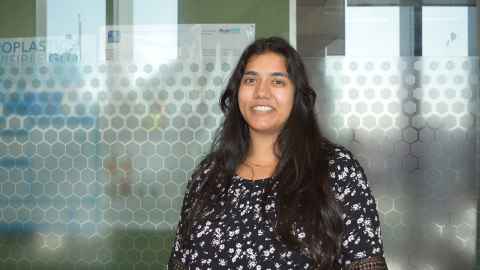Janki Patel
Janki Patel is working toward a PhD researching where erionite exists in New Zealand. She previously completed a BSc in Earth Sciences and a Master of Engineering Geology and will graduate with a PhD in 2024.

"I always enjoyed geography in high school, especially rock-related subjects, like volcanos and earthquakes. So, I enrolled in Earth Sciences as an elective and enjoyed the course so much that I switched majors.
"I heard about the new Master of Engineering Geology programme in my third year of a BSc. This programme seemed like a smart choice that would help my job prospects, so I enrolled in the degree.
"When it was time to pick a thesis project, I approached my current supervisor, Martin Brook. He told me about a mineral called erionite that is hazardous and very similar to asbestos but 800 times more carcinogenic. At the time, Martin was looking for a student to help with research using various geochemical techniques as a preliminary study they could later develop into a larger project.
Working on this project is very rewarding because it
feels like I am a part of something much bigger than myself.
"As I reached the end of my masters degree, Martin's research received funding. He offered me a position as one of the PhD students on his project 'Assessing and managing the risk of carcinogenic erionite in New Zealand.' I enjoyed my masters project, and this felt like an extension of that, so it made perfect sense.
"My work focuses on identifying where erionite exists in New Zealand. I hope my research will lead to the introduction of regulations surrounding erionite exposure for industries excavating rocks and tunnelling in locations where erionite is or might be found.
"Working on this project is very rewarding because it feels like I am a part of something much bigger than myself. Erionite is a carcinogenic mineral that has caused malignant mesothelioma, leading to many deaths overseas (namely in Turkey).
"My favourite aspect of the program is exploring New Zealand's natural beauty during field trips to collect rocks. It beats sitting in a stuffy office all day. I also really enjoy the process of geochemical analysis. It's super interesting to see rocks under scanning electron microscopes, to observe the minerals at the micro-scale, and see the chemical composition of the rocks I'm analysing. Identifying the ratios of different elements that make up the rocks is fascinating.
"I am a recipient of the University of Auckland doctoral scholarship, which has helped me with living costs and paying off uni fees. I also received the R N Brothers Memorial Award last year, which helped pay for field trip costs.
"My advice to anyone interested in studying earth sciences is to find a topic you really like and are passionate about. And you need to enjoy fieldwork.
"Studying one topic for years and writing a thesis on it can be difficult if you're not interested in the subject. But if you are passionate about your research, this is also why a PhD is fun.
"It's essential to find a supervisor you get along with. I am so thankful for my supervisors, Martin Brook and Melanie Kah. Martin also supervised my masters, and he is so kind and supportive. Words of encouragement can go a long way.
"I made some of my best lifelong friends during my undergrad and masters degrees. And the lecturers have been outstanding. In earth sciences, we are super lucky to have lecturers that are leading experts in their field and so knowledgeable".
We're always looking for stories to share from our passionate Science students. If you have a story, we'd love to hear from you. Email science-web@auckland.ac.nz.